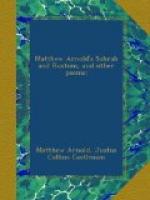=38. Afrasiab.= The king of the Tartars, and one of the principal heroes of the Shah Nameh, the Persian “Book of Kings.” He is reputed to have been strong as a lion and to have had few equals as a warrior.
=40. Samarcand.= A city in the district of Serafshan, Turkestan, to the east of Bokhara; now a considerable commercial and manufacturing centre, and a centre of Mohammedan learning.
=42. Ader-baijan.= The northwest province of Persia, on the Turanian frontier.
=45. At my boy’s years.= See introductory note to poem.
=60. common fight.= In the sense of a general engagement. Be sure to catch the reason why Sohrab makes his request.
=61. sunk.= That is, lost sight of.
=67. common chance.= See note, l. 60. Which would be the more dangerous, a “single” or “common” combat? Why?
=70. To find a father thou hast never seen.= See introductory note to poem.
=82. Seistan.= A province of southwest Afghanistan bordering on the Persian province of Yezd. It is intersected by the Helmund River (l. 751), which flows into the Hamoon Lake, now scarcely more than a morass. On an island in this lake are ruins of fortifications called Fort Rustum. This territory was long held by Rustum’s family, feudatory to the Persian kings. =Zal.= Rustum’s father, ruler of Seistan. See note, l. 232. [157]
=83-85. Whether that ... or in some quarrel=, etc. Either because his mighty strength ... or because of some quarrel, etc.
=85. Persian King.= That is, Kai Kaoos (or Kai Khosroo). See introductory note to poem; also note, l. 223.
=86-91. There go!= etc. The touching solicitation of these lines is wholly Arnold’s.
=99. Why ruler’s staff, no sword?=
=101. Kara Kul.= A district some thirty miles southwest of Bokhara, noted for the excellence of its pasturage, and for its fleeces.
=107. Haman.= Next to Peran-Wisa in command of Tartar army. See Houman, in introductory note to poem.
=113-114. Casbin.= A fortified city in the province of Irak-Ajemi, Persia, situated on the main route from Persia to Europe, and at one time the capital of the Iranian empire. Just to the north of the city rise the =Elburz Mountains= (l. 114), which separate the Persian Plateau from the depression containing the Caspian and Aral Seas.
=115. frore.= Frozen, from the Anglo-Saxon froren.
“...
the parching air
Burns frore, and cold performs the effect
of fire.”
—MILTON. Paradise Lost, ll. 594-595, Book II.
=119. Bokhara.= Here the state of Bokhara, an extensive region of Central Asia, touching the Aral Sea to the north, the Oxus to the south, and Khiva to the west. It has an estimated area of 235,000 square miles, and contains nineteen cities of considerable size, of which the capital, Bokhara, is most important.




